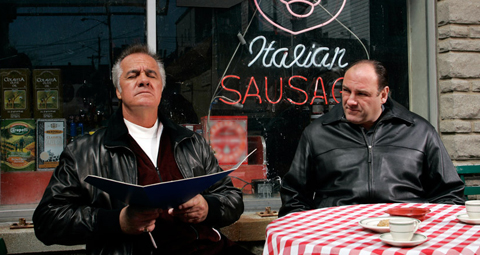December 21 | ![]() 0 COMMENTS
0 COMMENTS ![]() print
print

A violence-filled TV series that explored redemption
DR HARRY SCHNITKER reckons The Sopranos proves that the Catholic Imagination emerges in the most unlikely of places
THE Sopranos ended some years ago now, and I feel safer talking about the series as a paradigm of the Catholic Imagination than I would have done when it still aired. The series about Tony Soprano, the head of the New Jersey Mafia, featured plenty of sexual scenes, some astoundingly cruel violence and much more that sits uneasily with traditional Catholic morality. To use this series, therefore, as an expression of the Catholic Imagination seems at first to be rather gratuitous.However,the Catholic Imagination emerges in the most unlikely of places, continues to influence our contemporary world in ways that are surprising.
The Sopranos consists of six-and-a-half series of some of the most acclaimed and greatest TV ever produced anywhere in the world. It has the depth of the Great American Novel, lasted long enough for it to become part of the lives of those who watched from day one, and contained within it all the boredom of everyday life, paired with the high-octane episodes of the life of organised crime. Its main character, Tony, was a man both lovable and flawed, both caring and hateful.
Around him swirled a cast of the most complex people possible. Tony’s wife, Carmela, is a pious Catholic who was seduced by money and status.
His mother suffers from borderline personality disorder and revels in a sadistic enjoyment of other’s pain.
His sister, Janice, is a pretend hippie, with a lust for money and power.
His uncle, Junior, has walked out of The Godfather, but his love for his nephew and his dementia make him personable.
Tony’s children, the clever Meadow and the dim-witted AJ, try to make sense of life in this dangerous and incomprehensible world. They come to different conclusions: AJ becomes a follower of Nietzsche; Meadow, a liberal college student.
Outside his own family there is the ‘family.’ Tony’s consiglieri, Silvio Dante, played by the E-Street Band’s Steven van Zandt, is shallow, slippery and although he holds some strict morals he also runs a strip club.
Then there is Carmela’s nephew, Christopher, and his partner, Adriana. Chris is an addict, psychopathically violent, prone to self-pity and consumed by a wish to belong. Adriana is his light, a woman with severe limitations but who has plenty of love. For that love, she will be murdered.
The final two constants are Pauli, an unmarried Capo and mama’s boy, an old-fashioned mobster with ties to the community and deeply superstitious. The other one is Hash, a Jewish music producer and man of some style, whose presence serves to highlight the Catholic otherness of the Soprano world.
This unlikely rabble became the locus for some of the greatest story-telling. Much of it stemmed from the pen of David Chase, ably abetted by a strong team. Chase himself was raised in a Catholic New York environment, the only child of an Italian-American family, and his experiences are richly reflected in the series.
Chase alone wrote the show’s pilot, in which the essential elements of the series were presented, and the much-discussed final. As such, Chase was responsible for the overall narrative. And that narrative was deeply Catholic.
Essentially, The Sopranos is a redemption story. It deals with people who are both flawed and struggling, but who also have the capacity for good. As CNN’s faith and religion commentator, Fr Edward L Beck, wrote: “Tony Soprano was every man—and maybe every woman, too. That’s why we tuned in week after week—because we saw ourselves reflected, and we wanted to find out how we would turn out. While most of us have never belonged to the mob or killed anybody, we’ve all done things about which we are not proud, things we hope nobody finds out about.
“Yes, we are basically good people, but we have a darker side, too. We try to hide it or dress it up, but every once in a while it emerges, perhaps does some damage, and then recedes to the recesses of our lives until our next stumble. Kind of like Tony. Despite his occasional murder or infidelity, most of us thought Tony was a pretty good guy. We thought he only roughed up the bad guys who chose to put themselves in harm’s way with their profession choice.
“We believed he loved his wife, even though he cheated on her. We trusted he cared about his kids, even though it was sometimes with the back of his hand and punctuated with the F-word. Yes, Tony was a mass of contradictions, but that’s why we liked him. He made us feel better about our own contradictory lives because they seemed angelic in comparison to his.”
I quoted Fr Beck at length because I believe he had the measure of our own compulsion to watch. However, that compulsion went beyond what was noted by him. What was truly fascinating, and gruesome, was that when the chance of redemption came along, the Sopranos passed up on it.
Bishop Robert Barron once referred to Tony as an ‘Augustinian figure’; perhaps, but St Augustine did not pass on the option to be redeemed. Tony Soprano did.
The series had far too many points of redemption in them to review in this short article. However, there are two I wish to comment on. One was the option given to Carmela to redeem herself and her family, the other the astounding scenes around Tony’s coma, the closest I have known modern TV to approach a medieval Purgatory story.
Carmela’s point of redemption comes from visiting a Jewish psychoanalyst.
Where priests over the years have failed, although they did point out where Carmela’s support and implicit endorsement of her husband’s life would lead, the psychoanalyst succeeds—temporarily. Forcefully confronted with her own role, she vows to opt out, and manages it for the briefest of times.
Tony’s coma experience is shown to the viewer as a dream. He has been shot by his uncle suffering from dementia, and is now struggling for life.
He enters a type of Purgatory, a not unpleasant but vaguely sinister hotel. There, one of the most challenging aspects of the series, the question as to the meaning of life, finds an answer. On a TV screen in the bar, a text flashes up: “Are sin, disease and death real?” Behind the screen is a large cross. This is in series six, and the story arc is beginning to reach its conclusion. We are given some hope: after all the murder, compulsive sexuality, violence and madness, is Tony going to be redeemed?
The distraught Carmela whispers to the comatose Tony that she is sorry she told him he would go to hell (significantly, this was in the pilot episode), in yet another indication as to what is at stake.
The dream sequence plays over two episodes: Join the Club and Mayhem. In Mayhem, Tony’s descent into Purgatory reaches its climax. He meets his cousin, Tony Blundetto, whom he murdered to save the family. The other Tony takes him to a house in which a party is taking place. Almost Psycho-like, the silhouette of his mother is visible through the window.
Tony is invited to come in, to come home. Dressed up like a party, the house is hell. By an almost superhuman effort, and through the distraught pleas of his children, Tony comes out of his coma.
For some time, he seems a different man, intent on keeping faithful to his wife, trying to avoid violence. But he falls, tempted by a girl from the strip club. From there on, we know Tony is lost. A bleakness pervades the rest of the episodes.
Throughout The Sopranos, every series ended with Tony, Carmela and the children eating together in a restaurant. These are moments of peace, moments of redemption.
In the final episode, the family meets for such an event once more. Except this time there is a threat—and then darkness. Much discussed, for Catholics the meaning of the sudden end (no music, no subtitles) is obvious: Tony has died and gone to Hell.
The utter bleakness of The Sopranos’ main theme cannot disguise its essential Catholicity. The whole series was imbued with essential elements from the Catholic Imagination: family, meals, love, loyalty, community, Church and Communion, saints, processions, Holy Communions, Confirmations and funerals.
Above all, it was imbued with a sense that without the meta-narrative of Faith, life is an empty, meaningless struggle for nothing, which cannot be filled by cheap thrills, or acts of violence or even by sex and power. Almost all The Sopranos’ protagonists knew this: none managed to bring that knowledge to its natural conclusion and find redemption.










